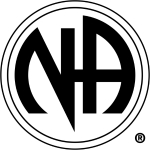Some thoughts regarding our
relationship to Alcoholics Anonymous
This article was generated by the World Service Board of Trustees in November 1985 in response to the needs of the fellowship. This bulletin was revised during the 1995-1996 conference year.
The question of just how Narcotics Anonymous relates to all other fellowships and organizations is one which may generate controversy within our fellowship. In spite of the fact that we have a stated policy of “cooperation, not affiliation” with outside organizations confusion remains. One such sensitive issue involves our relationship to the Fellowship of Alcoholics Anonymous. Letters have been received by the World Service Board of Trustees asking a variety of questions about this relationship.
Narcotics Anonymous is modeled after Alcoholics Anonymous. Nearly every NA community in existence has leaned to some degree on AA in its formative stages. Our relationship with that fellowship over the years has been very real and dynamic. Our fellowship itself sprang from the turmoil within AA over what to do with the addicts knocking on its doors. We will look at our roots for some perspective on our current relationship to AA.
Bill W, one of AA’s co-founders, often said that one of AA’s greatest strengths is its single-minded focus on one thing and one thing only. By limiting its primary purpose to carrying the message to alcoholics, and avoiding all other activities, AA is able to do that one thing supremely well. The atmosphere of identification is preserved by that purity of focus, and alcoholics get help.
From very early on, AA was confronted by a perplexing problem: “What do we do with drug addicts? We want to keep our focus on alcohol so the alcoholic hears the message, but these addicts come in here talking about drugs, inadvertently weakening our atmosphere of identification.” The steps were written, the Big Book was written—what were they supposed to do, rewrite it all? Allow the atmosphere of identification to get blurry so that no one got a clear sense of belonging? Kick these dying people back out into the streets? The problem must have been a tremendous one for them.
When they finally studied the problem carefully and took a stand in their literature, the solution they outlined possessed their characteristic common sense and wisdom. They pledged their support in a spirit of “cooperation, not affiliation.” This farsighted solution to a difficult concern paved the way for the development of the Narcotics Anonymous Fellowship.
But still, the problem that they wished to avoid would have to be addressed by any group that tried to adapt AA’s program of recovery to drug addicts. How do you achieve the atmosphere of identification so necessary for surrender and recovery if you let all different kinds of addicts in? Can someone with a heroin problem relate to someone with an alcohol or marijuana or Valium problem? How will you ever achieve the unity that the First Tradition says is necessary for recovery? Our fellowship inherited a tough dilemma.
For some perspective on how we handled that dilemma, one more look at AA history is helpful. Another thing Bill W. frequently wrote and spoke about was what he called the “tenstrike” of AA—the wording of the Third and Eleventh Steps. The whole area of spirituality versus religion was as perplexing for them as unity was for us. Bill liked to recount that the simple addition of the words “as we understood Him” after the word “God” killed that controversy in one chop. An issue that had the potential to divide and destroy AA was converted into the cornerstone of the program by that simple turn of phrase.
As the founders of Narcotics Anonymous adapted our steps, they came up with a “tenstrike” of perhaps equal importance. Rather than converting the First Step in a natural, logical way (“we admitted that we were powerless over drugs…”), they made a radical change in that step. They wrote, “We admitted that we were powerless over our addiction…” Drugs are a varied group of substances, the use of any of which is but a symptom of our disease. When addicts gather and focus on drugs, they are usually focusing on their differences, because each of us used a different drug or combination of drugs. The one thing that we all share is the disease of addiction. With that single turn of a phrase, the foundation of the Narcotics Anonymous Fellowship was laid.
Our First Step gives us one focus: our addiction. The wording of Step One also takes the focus of our powerlessness off the symptom and places it on the disease itself. The phrase “powerless over a drug” does not go far enough for most of us in recovery—the desire to use has been removed—but “powerless over our addiction” is as relevant to the oldtimer as it is to the newcomer. Our addiction begins to resurface and cause unmanageability in our thoughts and feelings whenever we become complacent in our program of recovery. This process has nothing to do with “drug of choice.” We guard against the recurrence of our drug use by applying our spiritual principles, before a relapse. Our First Step applies regardless of drug of choice and length of clean time. With this “tenstrike” as its foundation, NA has begun to flourish as a major worldwide organization, clearly focusing on addiction..
As any NA community matures in its understanding of its own principles (particularly Step One), an interesting fact emerges. The AA perspective, with its alcohol-oriented language, and the NA approach, with its clear need to shift the focus away from specific drugs, don’t mix well. When we try to mix them, we find that we have the same problem as AA had with us all along! When our members identify as “addicts and alcoholics” or talk about “sobriety” and living “clean and sober,” the clarity of the NA message is blurred. The implication in this language is that there are two diseases, that one drug is separate from another, so a separate set of terms is needed when discussing addiction. At first glance this seems minor, but our experience clearly shows that the full impact of the NA message is crippled by this subtle semantic confusion.
It has become clear that our common identification, our unity, and our full surrender as addicts depends on a clear understanding of our most fundamental principles: We are powerless over a disease that gets progressively worse when we use any drug. It does not matter what drug was at the center for us when we arrived. Any drug we use will release our disease all over again. We recover from the disease of addiction by applying our Twelve Steps. Our steps are uniquely worded to carry this message clearly, so the rest of our language of recovery must be consistent with our steps. We cannot mix these fundamental principles with those of our parent fellowship without crippling our own message.
Both fellowships have a Sixth Tradition for a reason: to keep each one from being diverted from its own primary purpose. Because of the inherent need of a Twelve Step fellowship to focus on one thing and one thing only, so that it can do that one thing supremely well, each Twelve Step fellowship must stand alone, unaffiliated with everything else. It is in our nature to be separate, to feel separate, and use a separate set of recovery terms, because we each have a separate, unique primary purpose. The focus of AA is on the alcoholic, and we ought to respect that fellowship’s perfect right to adhere to its own traditions and protect its focus. If we cannot use language consistent with that, we ought not go to their meetings and undermine that atmosphere. In the same way, we NA members ought to respect our own primary purpose and identify ourselves at NA meetings simply as addicts, and share in a way that keeps our message clear.
A casual, cursory glance at AA’s success in delivering recovery to alcoholics over the years makes it abundantly clear that theirs is a successful program. Their literature, their service structure, the quality of their members’ recovery, their sheer numbers, the respect they enjoy from society—these things speak for themselves. Our members ought not embarrass us by adopting a “we’re better than them” posture. That can only be counterproductive.
As a fellowship, we must continue to strive to move forward by not stubbornly clinging to one radical extreme or the other. Our members who have been unintentionally blurring the NA message by using drug-specific language such as “sobriety,” “alcoholic,” “clean and sober,” “dope fiend,” etc., could help by identifying simply and clearly as addicts, and using the words “clean,” “clean time,” and “recovery,” which imply no particular substance. We all could help by referring to only our own literature at meetings, thereby avoiding any implied endorsement or affiliation. Our principles stand on their own. For the sake of our development as a fellowship and the personal recovery of our members, our approach to the problem of addiction must shine through clearly in what we say and do at meetings.
Our members who have used these arguments to rationalize an anti-AA stand, thereby alienating many sorely needed stable members, would do well to re-evaluate and reconsider the effects of that kind of behavior. Narcotics Anonymous is a spiritual fellowship. Love, tolerance, patience, and cooperation are essential if we are to live our principles.
Let’s devote our energies to our personal spiritual development through our own Twelve Steps. Let’s carry our own message clearly. There’s a lot of work to be done, and we need each other if we are to be effective. Let’s move forward in a spirit of NA unity.
(Reprinted from Newsline Vol. 2, No. 6.)

